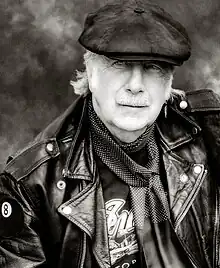
John Claridge (born 1944) is a British photographer, known for his work in advertising, black and white portraits in Soho and street photographs in the East End of London.
Early life
Claridge was born in Plaistow, London. His father worked in the docks, sold alcohol in New York during Prohibition[1] and was a bare-knuckle boxer in the dock areas in both New York and the East End; Claridge also boxed.[2] His mother was a shirt machinist working in Roman Road, Bow.[1] Aged 8, Claridge saw a plastic camera at an East End funfair and had to have it. A few years later, he saved up enough money from his paper round in the London docks to buy a proper camera to record the world he was growing up in.[3] From the age of 13, he started to buy jazz records, and it remained a lifetime obsession.[1] He had no formal training as a photographer but aged 15, began working for McCann Erickson advertising agency in their Photography and Design department.[4] He worked under Robert Brownjohn, the art director known for his James Bond title sequences, who encouraged him to have his first exhibition, of photographs on the East End, aged 16.[5]
Career
In 1961 he left to become assistant to David Montgomery and in 1964 he opened his own studio in London. His first commissions were for Management Today, Queen, Town, Harper’s, and Nova magazines. He went on to work for many types of companies, especially tourist boards and car companies.[6] From 1976 to 1989, Claridge lived and had his darkroom in a flat on Frith Street, Soho,[6] above Ronnie Scott’s Jazz Club.[7] He shot the 1993 Pirelli Calendar.[6] In April 2018, The Association of Photographers included Claridge in its 50th anniversary exhibition of some the world's most respected photographers.[8] His work is held in the collections of The Arts Council of Great Britain, the Victoria & Albert Museum, the National Portrait Gallery and The Museum of Modern Art.[1] He has won over 700 awards for his editorial and advertising work in the 1960s.[2]
Projects and series
Claridge began taking photos of the East End as a teenager in the 1960s. The series was published as a book (East End) in 2016.[9]
He began taking the jazz portraits series while living in his flat above Ronnie Scott's.[6] In 1986, he photographed Chet Baker in the club:
Chet Baker came in one night in 1986, and I asked him if I could do a couple of shots before he went on. I said: 'I’ve got to tell you, when I was 13, I bought the Chet Baker Quartet record with Winter Wonderland on it. Russ Freeman was the pianist … ' And Chet said, 'Yeah, he was, in 1953.' He just stopped and stared, going back through his memory. And that’s when I took the picture.[7]
Having grown up in a boxing family,[2] Claridge has taken over 100 photographs of members of the London Ex-Boxer's Association, which were serially published by The Gentle Author, 2012-2013.[10]
Of Claridge's Soho Faces project (2004-2017) he said, "I decided to document the customers at The French in earnest. For me, it was the one place in Soho that still held its Bohemian character, where people truly chose to share time and conversation, and I became aware that many I had once chinked glasses with were no longer around."[11]
Claridge took over 500 portraits for Soho Faces[11] and he is considered to have taken more photographs of the East End than any other photographer.[5]
Publications
Publications by Claridge
|
|
Publications with contributions by Claridge
- The Gentle Author's London Album. London: Spitalfields Life, 2013 (Boxers series)
Notes
References
- 1 2 3 4 Hanson, Kyra (27 September 2016). "Haunting Photos of the East End". The Londonist. Retrieved 18 May 2016.
- 1 2 3 Froud, Emily Rose. "Photography: John Claridge: Boxers, round one". Archived from the original on 27 November 2012. Retrieved 13 January 2020.
- ↑ "'My East End's gone, it doesn't exist any more. And these are pictures I could never do again, I don't have that naivety and innocence': photographer and Londoner John Claridge". Evening Standard. 9 September 2013. Retrieved 18 May 2018.
- ↑ "John Claridge (1944-)". www.npg.org.uk. National Portrait Gallery. Retrieved 18 May 2018.
- 1 2 The Gentle Author (7 August 2016). "The East End from the inside". The New Statesman. Retrieved 18 May 2018.
{{cite news}}:|last1=has generic name (help) - 1 2 3 4 Dye, David (23 June 2015). "IN-CAMERA 3: John Claridge". www.davedye.com. Retrieved 18 May 2018.
- 1 2 Beaumont, Thomas (17 August 2016). "John Claridge's best photograph: Chet Baker lost in memory". The Guardian. Retrieved 18 May 2018.
- ↑ "Celebrating 50 years of powerful photography". BBC. 17 April 2018. Retrieved 18 May 2018.
- ↑ "Corsets and chickens: the East End in the 1960s – in pictures". The Guardian. 17 June 2016. Retrieved 18 May 2018.
- ↑ The Gentle Author. "John Claridge's Boxers (Round Ten)". Spitalfields Life. Retrieved 14 June 2018.
{{cite web}}:|last1=has generic name (help) - 1 2 The Gentle Author (10 March 2017). "John Claridge's Soho Portraits". Spitalfields Life. Retrieved 18 May 2018.
{{cite journal}}:|last1=has generic name (help)
External links
- Official Website of John Claridge
- John Claridge's best photograph: Chet Baker lost in memory, published by The Guardian
- John Claridge in the National Portrait Gallery
- John Claridge in the Arts Council Collection
- John Claridge in Mind's Eye Gallery